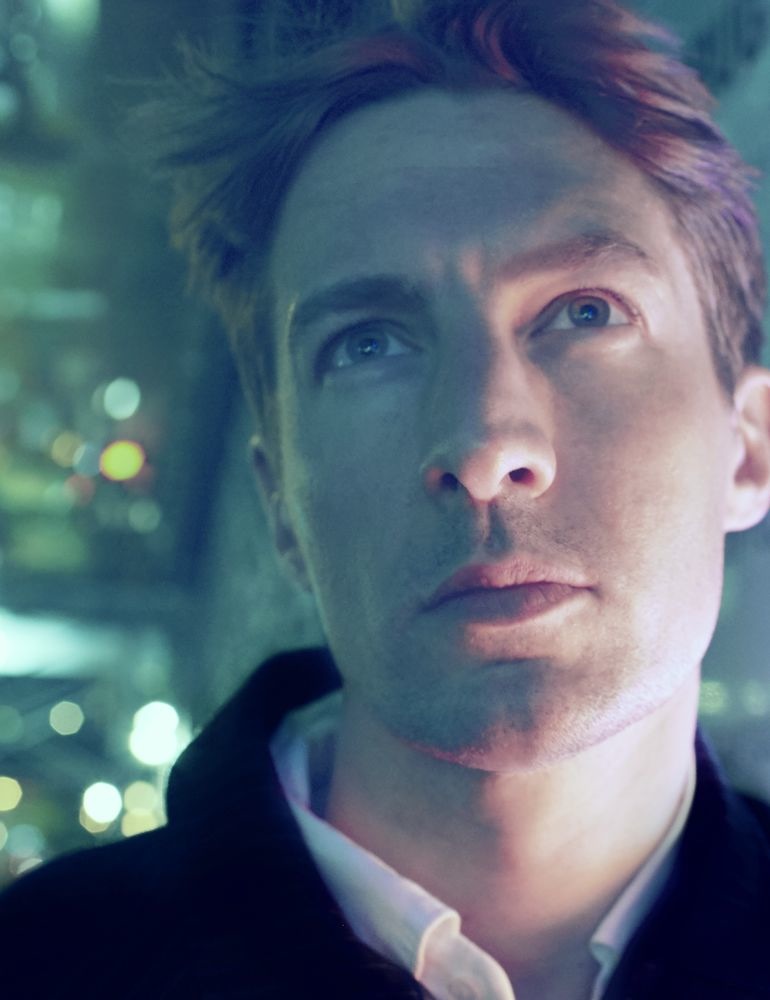Benn Northover
I think that everything I do is more about curiosity and investigation than it is about performance. BENN NORTHOVER
Who is Benn Northover? There are the bare facts: He was born 34 years ago in a small village on England’s east coast; he was diagnosed with dyslexia at an early age, but as a teenager found encouragement and inspiration from an art teacher who played him a recording of Ginsberg reading “Howl,” showed him Brando in On the Waterfront, and introduced him to the paintings of Jackson Pollock. There is the self-invention: He left his hometown in his late teens and spiraled through film, art, and fashion circles in London, Paris, New York, and Los Angeles. And there is the conjecture that self-invention inevitably sparks: Does anyone know the whole story? When you self-invent, it’s customary for different people to get different bits. For instance, I like the bit about the black belt in Kuk Sool Won, the Korean martial art, but his fraternally close friend Jefferson Hack has never heard a whisper of Korean martial arts. Among other things, Northover is an actor. He was in two Harry Potter movies. He is currently in a Zegna campaign. He is ardent about his fund-raising activities for Jonas Mekas and Anthology Film Archives. Those things are irrefutable. The rest would make an interesting movie. He could even play himself.
TIM BLANKS: If somebody were to ask me what you did, I wouldn’t really be sure, because every time you tell me what you’re doing, it is so different from what I was expecting you to say.
BENN NORTHOVER: You see me more in the context of my social life. I don’t work in fashion but you see me around people like Jefferson [Hack], who’s like my brother.
BLANKS: You do look alike.
NORTHOVER: Before we met, everybody used to tell him, “Oh, you remind me of this guy Benn Northover.” And people would tell me, “Oh, you remind me of this guy Jefferson.” So when we finally met six years ago, we just hit the ground running. And we’ve collaborated on a lot of stuff. The foundation of everything I do is very collaborative. I consider myself primarily an actor because I’ve worked very hard to be involved in cinema, but you know as well as I do, you can’t just stick to that.
BLANKS: Do you think of your life as a performance in a way?
NORTHOVER: Not really. I’ve never really been much of a show-off. I’m actually more shy than I look or act. Acting’s always felt like a kind of creature that lays dormant and collects observations when I’m not working. And then when I’m actually doing it, it just rises up. But everything I do is more about curiosity and investigation than it is about performance.
BLANKS: And that’s how you approach people when you meet them?
NORTHOVER: Yeah. I mean, you’ve seen me. [laughs] I’m very curious about people.
BLANKS: I was just going to say you’re a curiously immediate person—or maybe that should be an immediately curious person. The way you draw other people in, it’s almost like you’re directing them.
NORTHOVER: People have different ideas of who I am. And I think because I’m very private, people make up the strangest ideas of who and why and what.
BLANKS: But that’s inevitable when you never seem to stay in one place. And in each of the places you do land, you do something radically different from where you were, and that confuses people.
NORTHOVER: The other side of it, though, is I’m not very good at talking about me. If I meet you at dinner, I’m probably not going to tell you about the Brando documentary I just narrated or the film things I’ve done. I might tell you about the things that excite me, that I think might excite you, too, like raising money for Anthology Film Archives. I mean, I’m very proud of my work. I still get letters from people who watched House of Boys, a film I made that came out four years ago about the beginning of the AIDS virus. So we do leave a trail. But I think on a one-to-one basis, I’m not really a self-promoter.
BLANKS: Most dinner-party conversation consists of letting other people talk about themselves anyway. But I’m struck by the fact that, if you describe yourself as an actor, you seem to engage in a lot of activities that distract you from that calling. It’s almost willful.
NORTHOVER: Very early on in my life, I fell in love with cinema and the Beat Generation, and I just loved the feeling of reading and learning. And when I started to book jobs as an actor, I never really saw it as the main thing that I do. I see the same kind of curiosity and energy in why I take a photograph or why I collaborate on something. It kind of sounds clumsy to say that I’m an artist who acts as well. So it’s not really a distraction; it’s just I have so many interests and energies, and if it was all about me all the time, I’d get pretty bored.
BLANKS: That shows in the performances you’ve done so far. Do you think there’s a thread running through your film roles?
NORTHOVER: A lot of the characters that I’ve played are people who are trying to find themselves amongst the chaos of their lives, and they’re turning a blind eye to the truth of where they’re really at. I’m very interested in subtexts. It’s like that old line: “The text floats on top. Everything else is underneath the character’s surface.”
BLANKS: Why would you be drawn to that?
NORTHOVER: I just think people are always hiding something. When I was young, I remember seeing Rod Steiger in The Pawnbroker [1965] and Javier Bardem in Before Night Falls [2000] and even Sean Penn in Dead Man Walking [1995], and there was always this element of looking for the truth in oneself.
BLANKS: That rather begs the question: Are you hiding something?
NORTHOVER: Um … probably yes. [laughs] I think that’s just the fire in my belly to try to be as involved with the things I love as I can. When I met Jonas Mekas, I was still in my teens and didn’t really know what I wanted to do with my life. But I loved cinema, and Anthology is like a cathedral of cinema. It’s dedicated to preserving and showing artists’ films, independent films, avant-garde cinema. And none of it will survive unless it’s preserved. We want to expand the building. We want to build a secure housing for all the documentation in the film library, really improve the preservation equipment. Jonas Mekas is such a pivotal figure within the history of cinema that he calls it his final gift to New York City. We’re far off the mark in terms of money, but we have a lot of good allies.
BLANKS: Another thing that strikes me—you don’t seem driven by the sense of urgency I see in many young actors.
NORTHOVER: Don’t get me wrong, I am. But I’ve learned to not define myself by the commercial time line of it all. I did when I was in my late twenties: “I should be this by now.” We put a lot of excess pressure on ourselves with our career trajectory. I’ve curated a show at the Serpentine and at the Centre Pompidou. I’m working as a co-curator on a huge exhibition about the Velvet Underground for the Philharmonie de Paris. I feel the time pressure in a slightly melancholic sense of mortality. But I’ve tried to ease off on the industrial pressure on myself and just say, “As long as I’m building a good, solid body of work, as long as I’m really doing what I say I’m doing, I’m okay.” As soon as you judge yourself through others, you’re fucked, especially in this game. A long time ago, I stopped apologizing for not just wanting to be an actor and having massive Hollywood hits.
BLANKS: Was that ever something that you had in your mind?
NORTHOVER: No, the things that inspired me early on were so grounded in a different way of approaching cinema. One Christmas, my father gave me VHS tapes of Sidney Lumet’s The Pawnbroker and Paris Blues [1961], the one with Paul Newman and Sidney Poitier, and Sean Penn’s The Indian Runner [1991], and those were the things I fell in love with. And being a kid growing up in a small village in Suffolk, I just wanted to be involved in that kind of stuff. Elia Kazan was one of my heroes.
BLANKS: Which inevitably drew you to Brando and Dean …
NORTHOVER: I can’t tell you what a pleasure it was to narrate that documentary about Brando.
BLANKS: Could you identify with his feeling that good looks are a curse?
NORTHOVER: Yeah, I think I’ve fought against that forever. When I finished film school and I came to New York to study at the Stella Adler Studio, I did bits of fashion-y stuff and some commercials to pay my way, and I could never quite understand why I was doing any of that. I always saw myself as a big-nosed, big-eared kid. I’ve never tried to kind of capitalize on that stuff. I think a lot of people do when they can.
BLANKS: Actually, thinking about your curatorial activities, it seems like you’re curating your life as well. I know you’re very friendly with Steven Meisel. I feel that he does something similar.
NORTHOVER: He is an artist. I wouldn’t even call him a fashion photographer. The other day when we did the images for this story, there was no crew, no nothing. Steven and I share a great love for reportage photography, people like Saul Leiter and Helen Levitt and even Robert Frank. His ability to see character within an individual is so sharp.
BLANKS: What character does he see you as?
NORTHOVER: Me? We talk about characters in old films. He’s never actually defined it. But he’s somebody who always encourages my artistic process. I think he’s seen a lot of actors try to be the next big thing. But the problem with the next big thing is it moves on. I mean, Interview magazine will have a whole new lineup next month.
BLANKS: Incredible images of people who will be replaced in a couple of years.
NORTHOVER: I’ve seen so many people work so hard to do … what? All we can really do is build a strong body of work. I was blown away years ago by The Journey Is the Destination, anbook of Dan Eldon’s diaries. He was the young photographer who was stoned to death by a mob in Somalia in 1993. That book title is a very simple phrase, but I think it defines a lot. The process is as much a part of the work as the finished product itself. Actually, it defines the work.
BLANKS: Surely that’s life.
NORTHOVER: Well, it is. But look how many people try to define themselves only by their achievements.
BLANKS: As opposed to the process that got them to that achievement?
NORTHOVER: That’s why I love the process of making a film. Jonas Mekas is never defined by the show that just happened or the film he just made. I’m in awe of the way Steven works—the casting, the shooting, the execution. Then on to the next thing. Never sitting back and saying, “Look what I did.”
BLANKS: How old is Jonas Mekas now?
NORTHOVER: Jonas Mekas, my dear friend and cultural father, is 92 years old. And up to two years ago, the lead singer in two experimental bands. We’ve traveled the world together. He gave up drinking a couple of years ago. Before that, we bar-hopped in many a country. He’s an amazing man, a shaman of some form.
BLANKS: Age flattens and demoralizes some people. But there are others who are completely energized. In the last week, I’ve spent time with Giorgio Armani and with Karl Lagerfeld, and at no point do you feel that you’re with somebody who’s in their twilight years. They’re always on to the next thing.
NORTHOVER: Joseph Conrad described it as a shadow-line. Each of us comes to a certain point where, if you don’t cross the shadow-line, you stay open to life. It’s not that you try and stay young; you just stay open. But if you cross the shadow-line, you start to look back, and you base your values and your own identity on what was. How many people do I know who get to a point where they almost just settle down and wait to die?
BLANKS: So, at the ripe old age of 34, what else have you got on your plate at the moment besides Anthology and the Velvet Underground exhibition?
NORTHOVER: I knew that was coming. [laughs]
BLANKS: Well, I just want to know the full range of your activities.
NORTHOVER: Right now I’m about to go back to Europe to start work on a documentary about an incredible performance artist out of London called Maxime Angel. It was always my intention to direct. I went to film school. And then I wanted to know how to work with actors, so I went to acting school. And then by the end of that, I caught the bug. But for me, it was always the actor-directors like Sean Penn and John Cassavetes who I found most interesting. And then my brother Jack and I are working on a script that I’m going to direct. It’s a real ode to where we grew up, to all our friends who are still there, working in the Bernard Matthews turkey-processing factory.
BLANKS: Let’s see … That’s actor, model, curator, director. So I can say you’re a Renaissance man?
NORTHOVER: You can say whatever you want.
TIM BLANKS IS THE LONDON-BASED EDITOR-AT-LARGE FOR STYLE.COM







